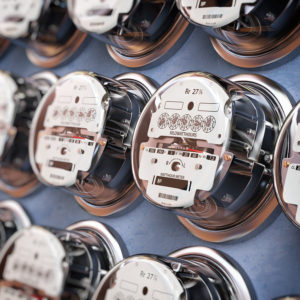State Rep. Rebecca McWilliams (D-Concord) says the $40 million in rebates New Hampshire ratepayers are currently receiving on their electric bills isn’t their money and she wants it back.
McWilliams commented on a House Science, Technology, and Energy Committee hearing on behalf of HB418, which would re-direct collections from the Energy Efficiency Fund away from individual ratepayers and give the money to the state.
At issue are the proceeds the state collects from participating in the Regional Greenhouse Gas Initiative. According to a report from the state Department of Energy, “prior to 2013, auction revenues from RGGI allowances were primarily directed to energy efficiency measures intended to reduce regional electricity demand and CO2 emissions.”
Today they are largely rebated to ratepayers. And while the state has collected around $240 million in auction revenues since entering RGGI, the annual savings of $40 million works out to about $30 per ratepayer. McWilliams’ bill, which is co-sponsored by Manchester Democratic Reps. Jacqueline Chretien and David Preece would give those funds to the state to administer energy efficiency programs.
“Instead of doing a refund, the money stays in the fund where it is intended to have long-term market impacts to adjust for our overreliance on fossil fuel and natural gas in the market,” McWilliams said.
Science, Technology, and Energy Committee Chairman Michael Vose (R-Epping) said that with energy bills soaring this is the wrong time to send ratepayers a higher energy bill.
“With already sky-high electric costs, saddling Granite Staters with an additional $40 million on their electric bills would be completely irresponsible,” Vose said. “It is not just electricity. We have also seen dramatic increases in the cost of food, heating fuel, and even gasoline. Proposing yet another increase in electric bills shows that Democrats are completely out-of-touch with the realities facing Granite Staters.”
McWilliams disagreed, arguing the money doesn’t belong to the ratepayers in the first place.
“This program takes the $30 and refunds it back,” McWilliams said. “That $30 does not belong to the ratepayer, but we’ve decided as a legislature to refund it over time. This bill corrects that.”
Vose released a statement calling out McWilliams’ comment.
“When confronted with questions about the cost to ratepayers, the prime sponsor of the legislation had the gall to say that the money ‘does not belong to the ratepayer.’ I am sure every ratepayer looking at their bill would beg to differ,” Vose said. “This is another example of House Democrats showing they cannot be trusted with New Hampshire’s energy policy. We strongly oppose this legislation and will fight to lower electric rates for Granite Staters.”
Granite State Democrats have argued for years that the green energy initiatives they’ve proposed, from ending the Energy Efficiency Fund rebates to subsidizing electricity from wind and solar sources would lower energy costs for consumers. Democratic gubernatorial candidate, former state Sen. Tom Sherman (D-Rye) made it a key part of his race against Gov. Chris Sununu last year.
However, Sherman and his fellow Democrats failed to explain how ending rebates or forcing more ratepayers to buy more expensive wind and solar power would lower costs in the short term.
In Tuesday’s hearing, McWilliams made the case that over the long term, reducing demand for electricity generated by fossil fuels, by increasing energy efficiency for example, would put downward pressure on prices.
“When we’re talking about the local high school doing a weatherization, for example, we’re reducing the amount of energy used in the state,” McWilliams said. “The demand has gone down so, technically, the supply has gone up because we’ve done large-scale efficiencies.”
But since the Granite State is on a regional electricity network, ISO-New England, any overall decrease in demand is going to have a negligible impact on price experts say.
Gov. Chris Sununu has vetoed similar bills in the past.
“I am disappointed that the legislature is jeopardizing the longstanding Regional Greenhouse Gas Initiative (RGGI) compromise yet again by trying to eliminate ratepayer rebates,” Sununu wrote in his 2020 veto letter. “This has become an annual exercise of attempting to strip away rebates for residential ratepayers.
I continue to support the existing RGGI funding allocation, which provides direct bill support to all ratepayers through rebates and funds energy efficiency programs in the state. This complimentary mix is a system that works for New Hampshire ratepayers, especially those who can least afford to bear the cost of higher energy bills.





